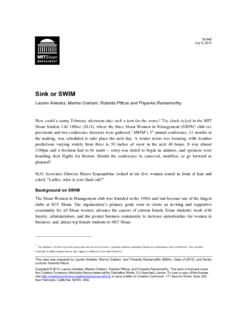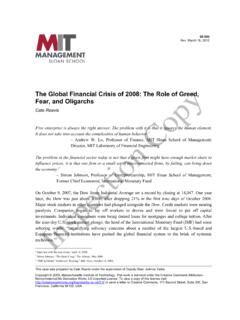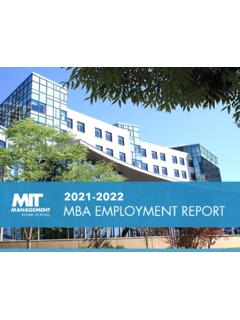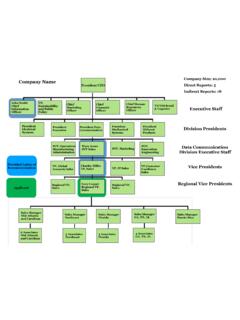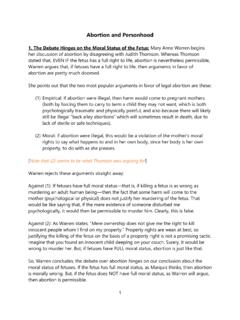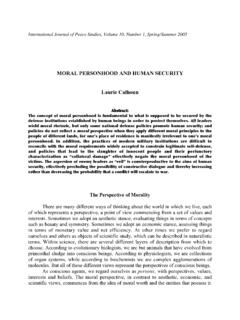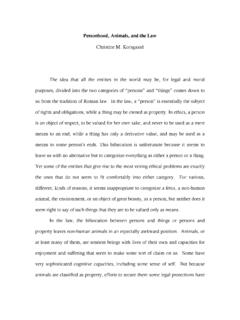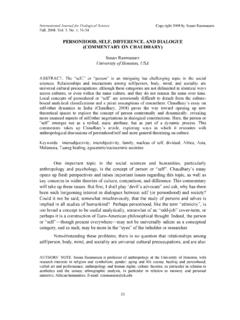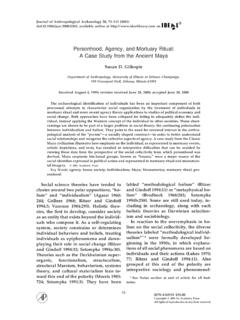Transcription of Corporate Personhood, Business Leadership, and the U.S ...
1 11-134 June 15, 2012 This case was prepared by Cate Reavis, Associate Director, Curriculum Development, under the supervision of Senior Lecturer Leigh Hafrey. Copyright 2012, Leigh Hafrey. This work is licensed under the Creative Commons Attribution-Noncommercial-No Derivative Works Unported License. To view a copy of this license visit or send a letter to Creative Commons, 171 Second Street, Suite 300, San Francisco, California, 94105, USA. Corporate personhood , Business leadership , and the Presidential Election of 2012 Leigh Hafrey, Cate ReavisLead the people by laws and regulate them by penalties, and the people will try to keep out of jail, but will have no sense of shame. Lead the people by virtue and restrain them by the rules of decorum, and the people will have a sense of shame, and moreover will become good.
2 Confucius, The Analects (II:3)1 The corporation s status as a legal person might seem an arcane matter, relative to the dire individual and organizational circumstances that set in following the subprime mortgage crisis of 2007. That crisis had evolved into the Great Recession, which still weighed on many real, flesh-and-blood human beings in the and global economies in 2012. Yet by 2012, Corporate personhood had become an issue in no less an event than the election of a president. Former Massachusetts Governor, Republican presidential candidate, and former Bain Capital CEO Mitt Romney commented to an interlocutor at the Iowa State Fair, in August 2011: Corporations are people, my friend.
3 Everything corporations earn ultimately goes to people. Where do you think it goes? 2 Incumbent President and Democratic candidate for re-election Barack Obama responded with equal certainty the following spring, telling an audience at a campaign stop in Ohio in May: I don t care how many ways you explain it, corporations are not people. People are people. 3 If the debate over Corporate personhood mattered to the American electorate as much as the candidates appeared to believe it should, how might businesspeople and the Business community at large assess a core structural element of global Business practice: the corporation? 1 Simon Leys, The Analects of Confucius (New York: Norton & Company, Inc.)
4 , 1997). 2 Philip Rucker, Mitt Romney Says Corporations Are People at Iowa State Fair, The Washington Post, August 11, 2011. 3 (accessed May 23, 2012). Corporate personhood , Business leadership , AND THE PRESIDENTIAL ELECTION OF 2012 Leigh Hafrey, Cate Reavis June 15, 2012 2 The Great Recession and Corporate Free Speech In early 2012, after five years of economic turmoil, glimmers of light indicated that the United States was emerging from the long dark tunnel that it had entered five years The stock market was nearing 13,000, unemployment had inched its way down to after hitting a high of 10% in October 2009 5and the home foreclosure rate for the year (at million homes, according to RealtyTrac) was the lowest since 2007.
5 Banks were showing signs of renewed confidence. Commercial and industrial lending was up 10% in the third quarter of 2011, compared to a decline the previous four However, the country s debt-to-GDP ratio remained a matter of deep concern: it had started a steep upward climb right at the time the Government began bailing out financial institutions, with a ratio of 40% in 2008, and over 70% at the end of 2011. As the economy appeared to improve, public attention focused on who should be held responsible for a crisis that had nearly brought down not only the , but the entire global financial system. Heightened by a number of best selling books, including The Big Short, Too Big To Fail, and 13 Bankers: The Wall Street Takeover and the Next Financial Meltdown; investigative pieces broadcast on the television news program 60 Minutes; feature films including Inside Job and Margin Call; and the Occupy Wall Street protest movement, the public s interest turned to the role that financial corporations had played in the crisis.
6 While many firms faced civil charges,7 no firm had been criminally charged for its involvement, no executives Beyond the possibility of criminal action lay the question of ethical responsibility: what curbs might corporations, or the boards and executives who ran them, have placed upon their operations during the run-up to the crisis? Could they themselves, as well as the society in which they operated, expect them to exercise such care, and if so, by what mechanism? Under law, corporations had rights and responsibilities, like natural persons. In the Santa Clara County vs. Southern Pacific Railroad Company ruling in 1886, the chief justice of the Supreme Court, Morrison Waite, is reported to have begun oral arguments by stating, The court does not wish to hear argument on the question whether the provision in the Fourteenth Amendment to the Constitution, which forbids a State to deny to any person within its jurisdiction the equal protection of 4 The Global Financial Crisis of 2008-2009: The Role of Fear, Greed and Oligarchs, provides a more detailed description of the financial crisis.
7 The note can be accessed at 5 Bureau of Labor Statistics, #empstat. 6 Steve Matthews and Ilan Kolet, Bank Credit Highest Since Before Lehman as Growth Continues, Bloomberg, December 11, 2011. 7A number of firms had paid fines for misleading investors without denying or admitting guilt. In 2011, Goldman Sachs settled a lawsuit with the Securities and Exchange Commission (SEC) agreeing to pay $550 million ( of its 2010 net income) and JP Morgan agreed to pay the SEC $ million (.9% of its 2010 net income). That same year, Citigroup agreed to pay $285 million ( of its 2010 net income), to settle civil charges that it had defrauded customers during the housing bubble. As part of the settlement, the company made a pledge to the SEC that it would never again violate one of the main antifraud provisions of the nation s securities laws.
8 The company had made the same pledge in July 2010, May 2006, March 2005, and April 2000. In September 2011 the Federal Housing Finance Agency, Fannie Mae and Freddie Mac s conservator since 2008, filed a lawsuit against 17 financial institutions Ally Financial, Inc., Bank of America, Barclays Bank, Citigroup, Inc.; Countrywide Financial Corporation; Credit Suisse Holdings, Inc.; Deutsche Bank. AG; First Horizon National Corporation; Goldman Sachs HSBC North America Holdings, Inc.; JPMorgan Chase Merrill Lynch & Franklin Financial Corp.; Morgan Stanley; Nomura Holding America Inc.; The Royal Bank of Scotland PLC; Soci t G n rale alleging violations of securities laws and common law in the sale of mortgage-backed securities. Seeking damages of $200 billion the FHFA alleged that the loans had different and more risky characteristics than the descriptions contained in the marketing and sales materials provided to the Enterprises for those securities.
9 8 Jean Eaglesham, Financial Crimes Bedevil Prosecutors, The Wall Street Journal, December 6, 2011. Corporate personhood , Business leadership , AND THE PRESIDENTIAL ELECTION OF 2012 Leigh Hafrey, Cate Reavis June 15, 2012 3 the laws, applies to these corporations. We are all of the opinion that it does. 9 Though the legal standing of Justice Waite s statement has been questioned,10 the opinion has been widely taken to confirm Corporate personhood in law. In 2010, the concept of the corporation as a fictitious person gained new complexity when the Supreme Court, in Citizens United v. Federal Election Commission, prohibited the government from banning Corporate and union expenditures related to political campaigns; in the Court s opinion, the ban violated the First Amendment right to free speech.
10 As Gov. Romney and President Obama s opposing views suggested, public opinion was sharply divided often along political party lines on whether corporations were indeed people, and if they were, what values they might choose to voice by exercising their right to free speech. The Accountability Question Ultimately, the question of personhood underlay the leadership role that both individuals at the top of the corporation and the corporations themselves had played or failed to play in the downturn. Those who believed that financial firms should be held accountable for their actions, including liability for harms committed by their agents,11 argued that, like people, corporations were granted rights, but also held to responsibilities that extended beyond the law to moral or ethical commitments to certain values.
